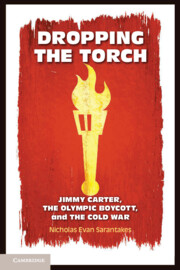Book contents
- Frontmatter
- Contents
- Acknowledgments
- Abbreviations
- Introduction Miracle on Ice
- Chapter 1 Lord Killanin and the Politics of the Olympics
- Chapter 2 Los Angeles versus Moscow
- Chapter 3 Jimmy Carter and U.S.-Soviet Relations
- Chapter 4 The Soviet Invasion of Afghanistan
- Chapter 5 The American Response
- Chapter 6 Easy Victories
- Chapter 7 Painful Losses
- Chapter 8 The White House Games
- Chapter 9 Coca-Cola, NBC, and the Defeat of the Iron Lady
- Chapter 10 The Vote in Colorado
- Chapter 11 Civil Wars
- Chapter 12 Carter versus Killanin
- Chapter 13 Moscow: The Olympics Are the Olympics
- Chapter 14 Los Angeles
- Chapter 15 Conclusion
- Epilogue
- Notes
- Bibliography
- Index
Chapter 7 - Painful Losses
Published online by Cambridge University Press: 05 September 2012
- Frontmatter
- Contents
- Acknowledgments
- Abbreviations
- Introduction Miracle on Ice
- Chapter 1 Lord Killanin and the Politics of the Olympics
- Chapter 2 Los Angeles versus Moscow
- Chapter 3 Jimmy Carter and U.S.-Soviet Relations
- Chapter 4 The Soviet Invasion of Afghanistan
- Chapter 5 The American Response
- Chapter 6 Easy Victories
- Chapter 7 Painful Losses
- Chapter 8 The White House Games
- Chapter 9 Coca-Cola, NBC, and the Defeat of the Iron Lady
- Chapter 10 The Vote in Colorado
- Chapter 11 Civil Wars
- Chapter 12 Carter versus Killanin
- Chapter 13 Moscow: The Olympics Are the Olympics
- Chapter 14 Los Angeles
- Chapter 15 Conclusion
- Epilogue
- Notes
- Bibliography
- Index
Summary
As January turned into February, the Carter White House made a number of efforts to implement the boycott on an international scale. It was at this time that the policy started to encounter a number of serious problems. The idealism and operational structure of the Olympic movement proved to be far more difficult to overcome than Carter expected.
The first major reversal came on February 2 in the library of Lord Killanin’s Dublin home. Lloyd Cutler had traveled to Ireland to meet personally with the IOC President. Killanin’s account of the meeting brings credit to neither man. “The first positive sign of trouble reached me on January 28,” the Baron noted in his memoirs. While the public record clearly indicates otherwise, his dismissal of Carter’s public remarks as “rumblings” shows that he failed to realize how serious the Americans were about the boycott, giving ammunition to his critics in the Olympic movement. Cutler started with what Killanin considered a long speech on the Soviet intervention in Afghanistan and how control of that country would put them in a good position to seize oil fields in Iran or move toward the Persian Gulf. “I was, as it turned out, to get a great shock,” he recalled. “I discovered that Cutler had not flown in from Washington to discuss, but rather instruct.” Killanin noted that Cutler tended to drop his head as he talked while maintaining his gaze, which gave the Baron the feeling that “he was looking at you out of the top of his eyes with the stabbing penetration of a lawyer.” Cutler told his host that the United States wanted the IOC to postpone or cancel the games. According to Killanin, Cutler put this statement in the form of a demand. He found it all rather patronizing. “Here again was the American attitude of bringing out the bulldozer to save someone from an awful fate, or what America thought was an awful fate. It was this sense of arrogance, not personally shown by Cutler but evident in the high-handed approach of the White House, that raised my hackles.”
- Type
- Chapter
- Information
- Dropping the TorchJimmy Carter, the Olympic Boycott, and the Cold War, pp. 114 - 130Publisher: Cambridge University PressPrint publication year: 2010

